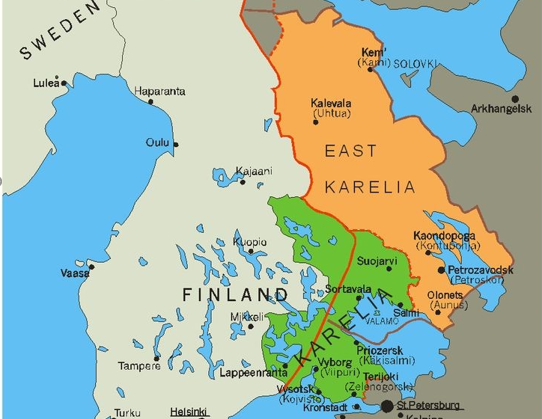
Copyright Andrew Andersen, 2003
The Centre for Scandinavian Studies is happy to host The Karelian Seminar that will take place on Wednesday, the 23th of October, 3:00-4:45 PM, Room 314 and will feature two presentations by distinguished speakers. Further you will find annotations of both lectures.
Dr. Ilya Solomeshch is a specialist in the history and historiography of Karelia and Russia and the history of Russian-Nordic relations. Before relocating to Vilnius in 2023, he worked at Petrozavodsk University, where he was responsible for the Nordic History Study Program and was one of the editors of the Nordic and Baltic Studies Review. In Vilnius, he has been a Grant Fellow at the European Humanities University and a lecturer at the NGO ''Švietimo iniciatyva Vilnis''.
Title: A Promised Land between East and West? Ambivalent images of Karelia in national master narratives, identity building, and history politics
Abstract: In the Finnish and Russian historiographical tradition and public space, approaches to the description of the history of Karelia do not coincide – and not only in assessments, but also in the fundamental methodological framing – ethnocentric vs. state-centric. As a result, Karelia appears as a space with blurred geographical boundaries and an uncertain correlation between its subjectivity and objectivity. The lecture aims to systematise and interpret the various connotations of Karelia in Finnish and Russian tradition – Karelia as a battlefield, a bridge, a corridor, a promised land, a space of peace and neighbourliness, and an outpost.
******
Dr. Satu Grünthal is a literary scholar and specialist in education studies. She works as an associate professor and supervisor for doctoral programs: School, Education, Society, and Culture and Philosophy, Arts, and Society at Helsinki University. In 2022-2024, she was visiting Assoc. Professor at Vilnius University and now she continues her cooperation with VU as supervisor of doctoral and MA students, and teacher of Finnish literature.
Title: Vyborg: representations and remembrances in literature and art
Abstract: Vyborg, founded in the 13th century, grew during centuries under Swedish, Russian and Finnish rule into a flourishing multicultural and multilingual community and became the capital of its region, the Karelian Isthmus. Before WWII, Vyborg was the second largest city in the independent state of Finland. During WWII, it was invaded trough Soviet troops and became part of the Soviet Union after the Paris Peace Treaty of 1947. In my talk I shall discuss how Vyborg – despite of decades past – has not lost its significance in the mental space and cultural memory of Finnish people. My focus lies on the ways Vyborg has been remembered, re-written and re-conceptualized in literature, as well in personal memoirs as in fiction and poetry. Vyborg literature is regarded and analyzed as a communally shared place of memory that makes a return to a lost time, space and city possible.
